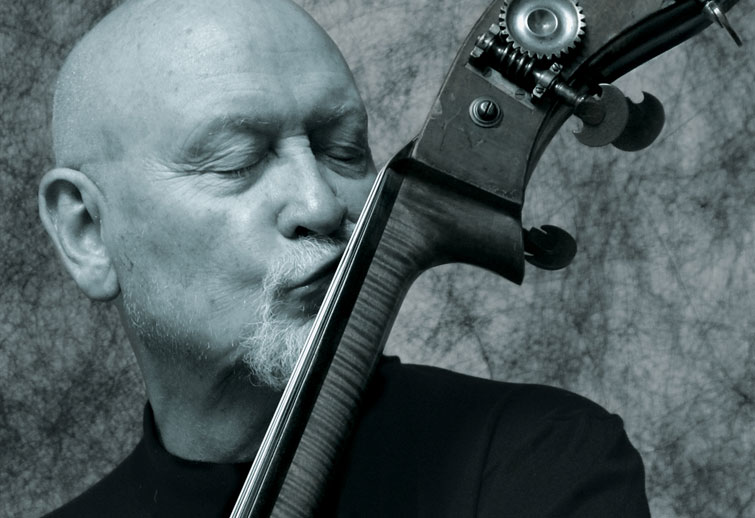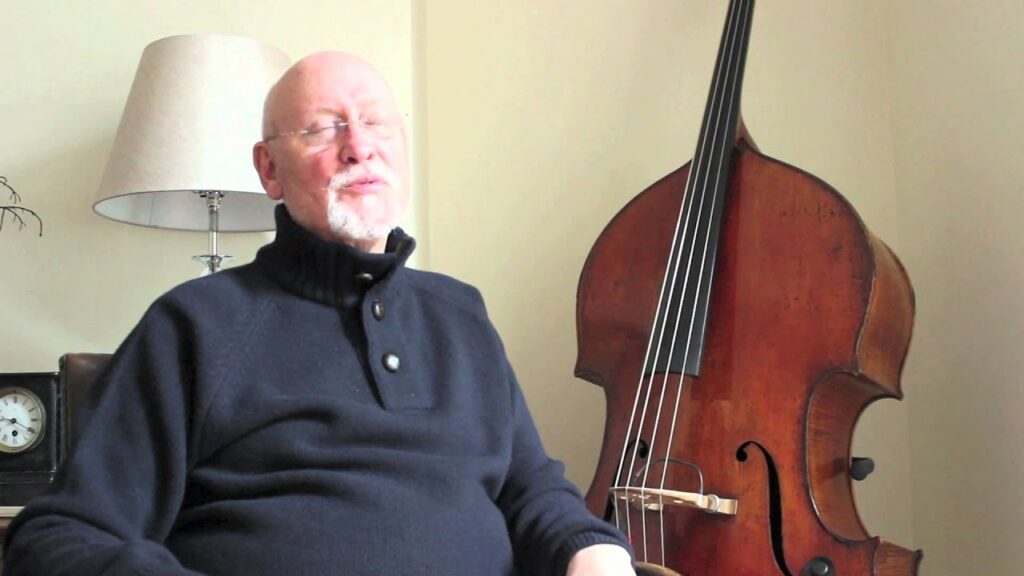
Danny Thompson was an English multi-instrumentalist best known as a double bassist. Across more than six decades he became one of the most respected and widely admired accompanists in British music.
His bass sound — resonant, melodic, and always sympathetic to the musicians around him — anchored records and concerts by a dazzling variety of artists, from John Martyn and Richard Thompson to Pentangle, Nick Drake, Kate Bush, and Toumani Diabaté. Thompson’s playing was never about virtuosity for its own sake: it was about listening, responding, and bringing a song to life.
Early life and beginnings
Danny Thompson was born Daniel Henry Edward Thompson on April 4, 1939 in Teignmouth, Devon, but his family soon moved to London, where he spent most of his childhood. His family was musical: uncles played in brass bands, and the atmosphere at home was filled with informal performance. From a young age he was restless to try out instruments. Guitar, mandolin, trumpet, trombone, and even the skiffle-era tea-chest bass all came under his fingers before he settled on the double bass as his true voice.
His early exposure to the trombone, particularly during his period of national service in army bands, gave him a grounding in phrasing, breath, and tone that he later transferred into his bass playing. That background would become important: Thompson’s double bass lines often had a horn-like singing quality, as though they were being phrased by a wind player rather than a string player.
By his mid-teens he was already playing professionally in London clubs. In the bustling musical climate of the late 1950s and early 1960s, he gravitated toward jazz and rhythm & blues. Soon he was working alongside saxophonist Tubby Hayes, pianist Stan Tracey, and guitarist Alexis Korner. With Korner’s Blues Incorporated, Thompson learned the art of blending jazz improvisation with the raw drive of rhythm and blues. That apprenticeship would prove crucial in his ability to cross musical boundaries later.
The 1960s: jazz, blues, and Pentangle
The 1960s saw Danny Thompson establish himself as a formidable bassist in Britain’s jazz and blues scene. His versatility, keen ear, and rhythmic drive made him the ideal partner for adventurous musicians. For a time he led a trio with guitarist John McLaughlin, a partnership that hinted at his ability to thrive in exploratory, improvisational settings.
His major breakthrough came in 1967 with the formation of Pentangle. Alongside Bert Jansch, John Renbourn, Jacqui McShee, and Terry Cox, Thompson helped create a group that fused folk traditions with jazz improvisation and contemporary song. Pentangle’s albums, with their intricate acoustic guitar interplay and ethereal vocals, were grounded by Thompson’s warm, resonant bass. He didn’t simply hold down the rhythm: he wove countermelodies, provided unexpected harmonic turns, and gave the music both gravitas and fluidity.
Pentangle quickly became a cornerstone of the folk revival, standing out for their willingness to stretch beyond traditional boundaries. Thompson’s contribution was central to their sound, and his profile as a bassist capable of shaping a band’s identity grew considerably.
A master accompanist
Although Pentangle gave him a public platform, it was Danny Thompson’s work as an accompanist that defined much of his career. Few bass players were as sensitive to singers and songwriters. He had an uncanny ability to make others sound better: to leave space when needed, to provide a lyrical line that deepened the emotional core of a song, or to give a performance a subtle rhythmic push.
One of his most celebrated partnerships was with John Martyn. On Martyn’s landmark 1973 album Solid Air, Thompson’s playing on the title track is often cited as a masterclass in double bass accompaniment: melodic, tender, and perfectly attuned to Martyn’s voice and guitar. The musical chemistry between Martyn and Thompson endured for decades, with Thompson appearing on numerous Martyn albums and tours. Their interplay — guitar and bass entwined in an almost conversational manner — became legendary.
.
Danny Thompson also became a regular collaborator with Richard Thompson (no relation), joining him on stage and in the studio through many phases of his solo career. Richard’s emotionally intense songwriting found an ideal partner in Danny’s sympathetic bass, which anchored the music without ever constraining its freedom.
Nick Drake’s early recordings likewise benefitted from Thompson’s touch. His lines on songs such as “Three Hours” or “Cello Song” added depth and tension without overpowering Drake’s fragile voice and guitar. For many listeners, it was Thompson’s bass that gave Drake’s music its pulse of warmth and humanity.
The list of artists he worked with is astonishingly broad: Kate Bush, John Lee Hooker, Donovan, Ronnie Scott, Talk Talk, David Sylvian, Loudon Wainwright III, and many more. In every context, Thompson was valued not just for his technical ability, but for his rare musical empathy.
Sound and style
Danny Thompson’s style was distinctive and instantly recognisable. Where many bassists emphasised percussive thump, he coaxed a singing, woody tone from the instrument. He treated the bass as both rhythmic and melodic, and he had a remarkable ability to “speak” through the instrument, almost like a vocalist. His phrasing had a horn-like quality, often stretching across the beat or shadowing the contours of a vocal line.
Crucially, he was never a showman. His virtuosity was real, but it was always placed at the service of the song. In interviews, Thompson often insisted that the role of the bassist was to listen above all else. His reputation as a “musician’s musician” came from that humility: he was content to be in the background if it meant making the music shine.
Solo and collaborative projects
Though primarily known as a sideman, Danny Thompson also pursued projects under his own name. In 1987 he released Whatever, a solo album that revealed his compositional voice and ability to structure ensembles around the bass. He formed his own quartet and participated in projects that explored new fusions of styles, from jazz to folk to world music.
One of his most ambitious collaborations was Songhai, recorded with Spanish flamenco group Ketama and Malian kora virtuoso Toumani Diabaté. The blend of West African, Spanish, and British traditions showed Thompson’s openness to global sounds and his adaptability in cross-cultural projects. He was equally at home playing traditional ballads, improvisational jazz, or experimental fusions.
From 1995 to 2013, he was a core member of the house band for the Transatlantic Sessions, the BBC/RTE series bringing together folk and roots musicians from both sides of the Atlantic. These sessions demonstrated once again his ability to accompany diverse performers with grace and imagination.
Recognition and influence
Over time, Danny Thompson’s stature grew from respected sideman to revered elder of the British music scene. In 2007 he received a Lifetime Achievement Award at the BBC Radio 2 Folk Awards. Musicians across generations cited him as a model of tasteful playing. His presence on a recording was often seen as a mark of quality, a guarantee that the rhythm section would be both solid and lyrical.
For bass players, he offered a different kind of role model: proof that you could be subtle rather than flashy, and still be unforgettable. Younger musicians studied his work on albums by John Martyn and Pentangle, learning how restraint could be as powerful as virtuosity.
Personal life
In addition to music, Danny Thompson’s personal journey was notable. He converted to Islam in 1990, adopting the name Hamza, and spoke publicly about the spiritual path that led him there. He appeared in documentaries and interviews reflecting on his beliefs, emphasising the sense of connection and peace he had found.
He lived for periods in Suffolk and London before settling in Rickmansworth, Hertfordshire. Known among friends and colleagues as generous, funny, and down-to-earth, he was loved not just for his music but for his humanity. Musicians often recalled his warmth backstage, his encouragement for younger players, and his ability to lighten the mood with humor.

Later years and final performances
Even into his seventies and eighties, Danny Thompson remained musically active. He continued to perform live, to mentor young players, and to appear at folk and jazz festivals. His participation in later editions of the Transatlantic Sessions introduced him to new audiences, who were struck by his ability to connect across generations and genres.
Though less active in his later years, he remained a touchstone figure in British music, occasionally appearing in interviews and retrospectives to reflect on his career.
On September 23, 2025, Danny Thompson died at home in Rickmansworth at the age of 86.
Legacy
Danny Thompson’s legacy is vast but subtle. Unlike a star frontman, his name was often in the small print — yet the recordings he played on are cornerstones of British and international music. His work with John Martyn, Richard Thompson, Nick Drake, Pentangle, and countless others represents a golden thread through the history of folk, jazz, and beyond.
What endures most is not only the long list of collaborators, but the sound itself: that singing bass, always listening, always responsive, always adding something essential but never intrusive. Thompson proved that greatness on an instrument can lie in humility, in service to others, and in the ability to make music breathe.
For future generations of bass players, his recordings remain a masterclass in taste and empathy. For listeners, his playing continues to be the deep, resonant heartbeat in some of the most cherished songs of the last half-century. And for his colleagues, Danny Thompson will be remembered as the rarest of musicians: one who made the music — and the people who made it — better.
Check out Danny Thompson on Amazon by clicking here.
If you found this interesting please share it with your friends and family, and check out some of our other articles on Musicians who Died in 2025.
.


Sad day!